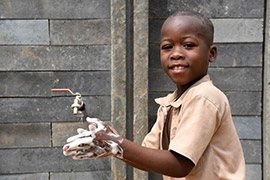Coronavirus disease (Covid-19), recently declared a pandemic by the WHO has caused panic and death around the world. Many countries have adopted measures including the shutting down of schools, restrictions of large gatherings, etc. The government of Cameroon on March 17 announced measures to contain the spread of the virus including:
- The closure of all public and private training establishments of the various levels of education, from nursery school to higher education, including vocational training centres and professional schools;
- Restriction of gatherings of more than fifty (50) persons;
- Closure of restaurants and entertainment spots from 6 p.m.;
- Regulation of consumer flows in markets and shopping centers;
- The postponement of school and university competitions, like the FENASSCO and University games, etc.
While we applaud the measures put in place by the government, we believe what is more important is how effective they are implemented. There have been reports of people still gathering in large crowds of more than 50, of continuous unregulated flows into markets and shopping centres and of some entertainment spots including bars still operating after 6 p.m. This raises a question about the effectiveness of children being taken out of school only to find themselves in places more crowded than their classrooms. It wouldn’t be surprising to see that during such period many children will be called upon to help their parents, relatives or guardians to hawk in crowded markets.
The shutting down of schools throughout the national territory means millions of school pupils and students are forced to stay at home. Young people in the Anglophone regions have already suffered the effect of school shutdown for the past 4 years as a result of conflict ravaging the regions. The current coronavirus pandemic only exacerbates the impact on young people within these regions. Out of school without access to other forms of education can often prove counterproductive for young people of school going age, especially those from underprivileged backgrounds. In such circumstances young people suffer the risk of exploitation, unwanted pregnancies, loss of opportunities, etc.
UNESCO Director-General Audrey Azoulay stated that “The global scale and speed of the current educational disruption is unparalleled and, if prolonged, could threaten the right to education,” The agency said the effects could include:
- Interrupted learning: When schools close, children and youth are deprived of opportunities for growth and development. Under-privileged learners with fewer educational opportunities beyond school are the hardest hit.
- Nutrition: Many students rely on free or discounted meals provided at schools for food and healthy nutrition.
- Dropout rates: It is a challenge to ensure children and youth return and stay in school when schools reopen after closures. Dropout rates rise in protracted closures.
While some institutions in advanced countries are putting in place measures to minimise the impact of the school shutdown, which include distance learning, children in many parts of the world would have to stay home without any possibility of learning. Most children around the world don’t have access to internet. In Cameroon, for example, most young people don’t have computers at home nor access to the internet. In recent days frequent power outages in major cities around the country including within the southwest region have left many going without power supply for days. This not only undermines any possibility of home-schooling for young people but equally makes their stay at home boring. We would like to call on the attention of the authorities concerned to do something to ensure that the power situation is adjusted sooner than later.
While we at SODEI are leading a campaign of sensitization on the coronavirus, we are equally interested in continuous play and learning opportunities for young people during the period of shutdown. Amidst the fear and uncertainty young people still have the need to play and learn. Children despite the circumstances still need to play.
Children can continue to engage in productive activities at home with their parents. Aside from helping them with their actual schoolwork, parents should consider involving children in household activities such as cooking, house chores, etc, in ways that are fun. If possible, children can be engaged in some form of craftwork including beading, knitting, sewing, etc. However, attention should be given to children’s need to play and have fun. Play with family members can be very useful during this time and provides an opportunity for family bonding.
Keeping in mind the regulations and guidelines recommended by the government on public spaces during this period, at SODEI we offer a variety of indoor activities for children. Our LESPLAY program components include a variety of activities to wit: creative arts (painting, photography, drawing and sketching); acting (drama/role play, debate and public speaking); games (chess, puzzle, scramble). We will continue to do our best to ensure that children enjoy their childhood despite the circumstances and take measures to safeguard our young ones and educate them on precautions to be taken to avoid the Coronavirus.




